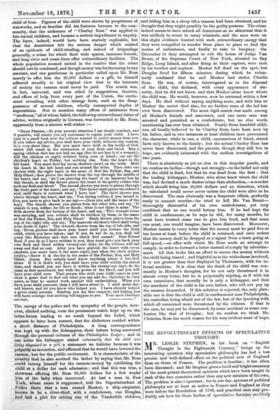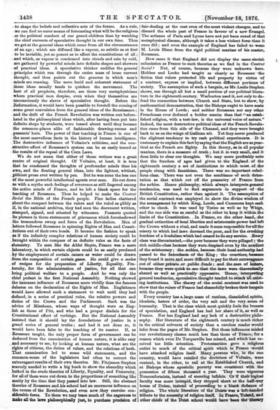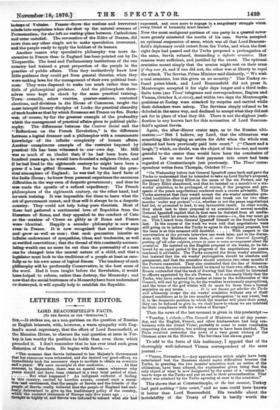THE REVOLUTIONARY EFFECTS OF SPECULATIVE THOUGHT.
MR. LESLIE STEPHEN, in his book on "English Thought in the Eighteenth Century," brings up the interesting question why speculative philosophy has had a leas precise and well-defined effect on the political acts of England than on those of France. The problem is familiar ; it has often been discussed ; and Mr Stephen gives a lucid and bright summary of the most potent theoretical opinions which have been taught in each of the two countries rather than any new solution of his own. The problem is also i.nportant ; for in our day, systems of political philosophy are at least as active in France and England as they were before the Revolution of 1789, and practical men may pro- fitably ask how far those bodies of speculative doctrine are likely
to shape the beliefs and collective acts of the future. As a rule, we can find no surer means of forecasting what will be the religious or the political conduct of our grand-children than by watching the chief currents of speculative thought in our own time. Thus we get at the general ideas which come from all the circumstances
of an age ; which are diffused like a vapour, so subtile as at first to be invisible, yet so potent as to affect the constitutions of all ; and which, as vapour is condensed into clouds and rain by cold, are gathered by powerful minds into definite shapes and showers of practical ideas. A speculative thinker codifies the general principles which run through the entire mass of loose current thought, and thus points out the grooves in which men's minds are running. The mere lucid and coherent statement of those ideas usually tends to quicken the movement. The best of all prophets, therefore, are those very metaphysicians whom practical men despise, even when they themselves are unconsciously the slaves of speculative thought. Before the Reformation, it would have been possible to foretell the coming of some great convulsion from the general ideas of the Renaissance ; and the drift of the French Revolution was written out before- hand in the philosophical ideas which, after having been put into definite shape by students, were tossed about until they became the ccrmmon-places alike of fashionable drawing-rooms and peasants' huts. The power of that teaching in France is one of the most marvellous facts in the history of human intelligence. The destructive influence of Voltaire's criticism, and the con- structive effect of Rousseau's system can be as easily traced as the results of the repeal of the Corn Laws.
We do not mean that either of those writers was a great centre of original thought. Of Voltaire, at least, it is true that he condensed the thoughts of profounder minds than his own, and the floating general ideas, into the lightest, wittiest, pithiest prose ever written by pen. But he was none the less one Of the most powerful intellectual agents ever seen. He cut down as with a scythe such feelings of reverence as still lingered among the active minds of France, and be left a blank space for the teaching of Rousseau. Thus he helped to make the Contrat Social the Bible of the French people. Fine ladies chattered about the compact between the rulers and the ruled as glibly as in the national archives, they had seen the document written, stamped, signed, and attested by witnesses. Peasants quoted its phrases in those statements of grievances which foreshadowed the tremendous sweep and force of the Revolution. Men of letters followed Rousseau in spinning Rights of Man and Consti- tutions out of their own heads. It became the fashion to speak as if the infinitely complex relations of human society could be brought within the compass of as definite rules as the facts of chemistry. To men like the Abbe Sieyes, France was a mere laboratory, in which certain objects could be as easily produced by the employment of certain causes as water could be drawn from the composition of certain gases. He could give a series of recipes for the preparation of Liberty, Equality, Fra- ternity, for the administration of justice, for all that can bring political welfare to a people. And he was only the chief pedant in the first National Assembly. Nothing showed the immense influence of Rousseau more vividly than the famous debates on the declaration of the Rights of Man. Englishmen Would have allowed such a statement to wait until they had defined, in a series of practical rules, the relative powers and duties of the Crown and the Parliament. Such was the advice of Mirabeau, whose ways of thought were as Eng- lish as those of Pitt, and who had a proper disdain for the Constitutional effect of verbiage. But the National Assembly insisted that it should lay the foundations of justice in a grand series of general truths ; and had it not done so, it would have been false to the teaching of its master. If, as Rousseau taught, the only proper form of government can be deduced from the examination of human nature, it is alike easy and necessary to see, by looking at human nature, what are the rights of citizens, the duties of rulers, and the relations of both. That examination led to some wild statements, and the common-sense of the legislators had often to correct the extravagant results of their own theories. Mr. Fitzjames Stephen scarcely needed to write a big book to show the absurdity which lurked in the crude theories of Liberty, Equality, and Fraternity, for all of them were cut down to the proportions of something like sanity by the time that they passed into law. Still, the abstract theories of Rousseau and his school had an enormous influence on the course of the Revolution, and even now they exercise con- siderable force. To them we may trace much of the eagerness to Make all the laws philosophically just, to purchase precision of
fair-dealing at the cost even of the most violent changes, and -to discard the whole past of France in favour -of a new Evangel.
The artisans of Paris and Lyons have not yet been cured of that metaphysical disease, although it takes a less violent form than it once did ; and even the example of England has failed to -wean M. Louis Blanc from the rigid political maxima of his master, Rousseau.
How came it that England did not display the same slavish submission as France to such theories as we find in the Contra Social? Not, of course, because they were unknown here. Hobbes and Locke had taught as clearly as Rousseau the fiction that rulers protected life and property by virtue of a contract, express or implied, between different portions of society. The assumption of such a bargain, as Mr. Leslie Stephen shows, ran through all but a small portion of our political litera- ture in the eighteenth century. Warburton used it, not only to de- fend the connection between Church and State, but to show, by mathematical demonstration, that the Bishops ought to have seats in the House of Lords ; and neither Rousseau nor any other Frenchman ever deduced a bolder maxim than that "an estab- lished religion, with a test-law, is the universal voice of nature." Indeed, the most destructive political ideas of the French Revolu- tion came from this side -of the Channel, and they were brought back to us on the wings of Gallican wit. Yet they never produced the slightest tendency to try rash political experiments. It is customary to explain this fact by saying that the English are as prac- tical as the French are flighty. In this theory, as in all popular maxims, there is a measure of truth ; but it is very small, and it does little to clear our thoughts. We may more profitably note that the freedom of ages had given to the England of the eighteenth century a set of institutions to which most of the people clung with fanaticism. There was no important rebel- lious class. There was not even the semblance of such detes- tation as that which cut off the peasantry of France from the nobles. Hence philosophy, which always interprets general tendencies, was used to find arguments in support of the British Constitution, rather than against it. The assumption of the social contract was employed to show the divine wisdom of the arrangement by which King, Lords, and Commons kept each other in check. It was used by Tories as well as by Whigs, and the one side was as careful as the other to keep it within the limits of the Constitution. In France, on the other hand, the gradual extinction of local liberties and aristocratic power had left the Crown without a rival, and made it seem responsible for all the misery to which bad laws doomed the poor, and for the crushing burdens of a feudalism which had ceased to do any service. Every class was discontented,—the poor because they were pillaged ; the rich middle-class because they were,despised even by the neediest of the aristocracy ; the nobles, because their local authority had passed to the Intendants of the King ; the courtiers, -beeatuie they found it more and more difficult to pay for their extravagance out of either private or public funds ; and the men -of letters,, because they were,quick.to tiee that the laws were theoretically absurd as well as practically oppressive. Hence, interpreting general tendencies, speculative thought tended to attack all exist- ing institutions. The theory of the social contract was used to show that the rulers of France had shamefully broken their bargain with the people.
Every country has a large mass of restless, dissatisfied spirits, idealists, haters of order, the very salt and the very scum of humanity. That is the class which most quickly feels the breezes of speculation, and England has had her share of it, as well as France. Nor has England had any lack of a destructive philo- sophy. Her literature of the eighteenth century is much richer in the critical solvents of society than a careless reader would infer from the pages of Mr. Stephen. But those influences misled our revolutionary classes much less than those of France, for a reason which even De Tocqueville has missed, and which has re- ceived too little attention. Protestantism gave a religious outlet to much of the critical spirit which in France -would have attacked religion itself. Many persons who, in the one country, would have retailed the doctrines of Voltaire, were content, in the other, to rail at the Established Church, and at Bishops whose apostolic poverty was consistent with the possession of fifteen thousand a year. They were vigorous Nonconformists, instead of sneering infidels. Or if their logical faculty was more intrepid, they stopped short at the half-way house of Deism, instead of proceeding to a blank defiance of religion. The whole literature of the Deists was a left-handed tribute to the necessity of religion itself. In France, Toland, and other chiefs of the Deist school would have been the-literary
lackeys of Voltaire. France drove the restless and irreverent minds into scepticism when she shut up the natural avenues of Protestantism, for she left no resting-place between Catholicism and utter unbelief. The revocation of the Edict of Nantes, did more than any other single act to make speculation irreverent, and the people ready to apply the boldest of its lessons.
Another reason why speculative philosophy was more de- structive in France than in England has been pointed out by De Tocqueville. The local and Parliamentary institutions of the one country had trained a great proportion of the people in the practice of public affairs. Thus they instinctively knew how little guidance they could get from general theories, when they were making laws for the management of their own political busi- ness. They were disposed to make too much rather than too little of philosophical guidance. And the philosophers them- selves were kept in check by the same practical training. Town councils, select vestries, quarter-sessions, contested -elections, and divisions in the House of Commons, taught the most intrepid literary disciples of Locke the practical absurdity of such books as that by which Rousseau set France on fire. Burke was, of course, by far the greatest example of the profundity which the management of practical affairs gives to political philo- sophy. The differences between the Contrat Social and the " Reflections on the French Revolution," is the difference between a logical dreamer and a philosopher with a consummate knowledge of the infinite complexity of human affairs. Another conspicuous example of the restraint imposed by practical life has been witnessed in our own day. Mr. Mill was so much of an idealist that, if he had been born four hundred years ago, he would have founded a religious Order, and if he had lived in the eighteenth century he might have been a purer if a less gifted Rousseau. But he breathed the prac- tical atmosphere of England ; he was tied by the hard facts of the India House ; he knew from personal experience the enormous difficulties in the way even of despotic government ; and thus he was made the apostle of a refined expediency. The French philosophers of the eighteenth century, on the other hand, had no such training. It was impossible for them to learn what the art of government meant, and thus will it always be in a despotic country. They could not help being pure theorists. Most of them had gathered a sentimental love of Republics from the literature of Rome, and they appealed to the conduct of Cato or the maxims of Cicero as glibly as if Rome and France were identical. Happily a sounder philosophy is now seen even in France. It is now recognised that nations change and grow as well as men ; that each generation inherits an infinite endowment of sympathies, ideas, and tendencies, as well as verified convictions ; that the thread of this constantly accumu- lating wealth can no more be cut than the personality of a man can be changed into the mental nature of a child, and that a legislator must look to the traditions of a people at least as care- fully as to his own sense of logical fitness. The tendency of such philosophy will be profoundly Conservative, in the best sense of the word. Had it been taught before the Revolution, it would have helped to reform, rather than destroy, the Monarchy ; and now that the social buttresses of a Monarchy have been undermined or destroyed, it will equally help to establish the Republic.








































 Previous page
Previous page